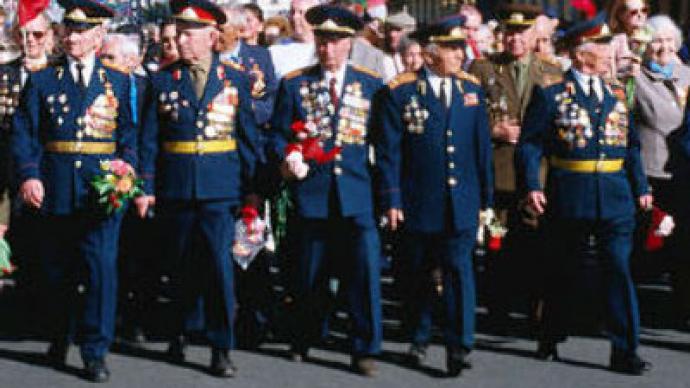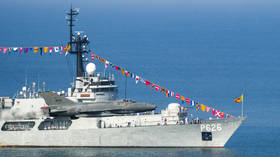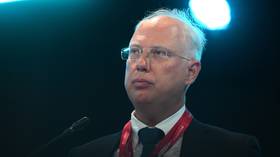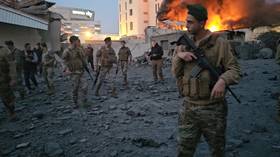“The 65th anniversary of the Victory cannot be over-emphasized”

On April 30, 2010 Foreign Ministry spokesman Andrey Nesterenko briefed journalists on Russia-US adoption talks, events dedicated to the 65th anniversary of the WW2 victory and a series of international issues.
Read the full transcript of Andrey Nesterenko’s briefing
Sergey Lavrov’s attendance at PACE’s spring session
Yesterday, April 29, Russian Minister of Foreign Affairs Sergey Lavrov attended the 61st Spring PACE Session as special guest.
The centerpiece of the Minister’s speech at the session was the significance of the 65th anniversary of the Victory in the Great Patriotic War and World War II for the formation of today’s democratic European order. Emphasis was placed upon the decisive contribution of our country to the defeat of fascism and the inadmissibility of falsification of this tragic chapter in the history of the continent was noted. The Minister set out in detail the Russian approaches to shaping a new European architecture in line with President Dmitry Medvedev’s initiative for a European Security Treaty.He met with Mevlut Cavusoglu, President of the Parliamentary Assembly of the Council of Europe, and Thorbjorn Jagland, the Council of Europe’s Secretary General.
Lavrov and Cavusoglu discussed topical issues of the Russian Federation's participation in CoE activities. They had a thorough exchange of views on how to enhance the role of PACE in eliminating dividing lines on the continent and to promote a unifying agenda of the Assembly more actively.
The conversation with Secretary General Jagland touched on a broad range of issues concerning the work of the Strasbourg body, noting the need to bolster the role of the Council of Europe in pan-European integration efforts, more specifically in the creation of a pan-European human rights and humanitarian space.
During the session, the Minister attended the opening ceremony prepared with the participation of the National Council of Russian Children and Youth Associations for the exhibition “The Young Multiethnic Russia,” which was held at the Palais de l'Europe (CoE headquarters) from April 26 to 29.
The visit to Moscow by a Bolivian government delegation
Following up the agreement reached on April 2 in Caracas during the course of the meeting between Russian Prime Minister Vladimir Putin and President of the Multinational State of Bolivia Evo Morales, a Bolivian government delegation visited Moscow to hold talks on co-operation in oil and gas, mining and MTC, as well as in transport.
The Bolivian representatives had a number of meetings in the relevant ministries and agencies of our country that ended with the reiteration of the mutual interest and willingness of the two sides to develop many-sided co-operation in the future.
Bolivia is a leader among Latin American countries in terms of its energy and mineral resources, which creates additional opportunities for expanding Russian-Bolivian relations.
The outcome of Russian-US talks on adoption
Russian-US consultations on adoption took place yesterday, April 29, at the Russian Foreign Ministry.
The US interagency delegation was comprised of officials from the Department of State and US Citizenship and Immigration Services. Among those attending from the Russian side were MFA representatives, Children’s Ombudsman Pavel Astakhov, Natalia Karpovich, First Deputy Chairwoman of the Duma Women, Children and Family Affairs Committee, and officials from the Ministry of Education and Science, Prosecutor General’s Office and the Ministry of Justice.
In our judgment, the meeting was businesslike and constructive. In the course of the consultations, we set out to the US side our principled stand on adoption and emphasized that the current arrangement does not provide adequate protection of the rights, life and health of Russian children in adoptive American families. The recent tragic events, especially the latest egregious incident of the “return” of a seven-year-old boy to Russia, make it impossible to keep things as they are. The Russian side insists on concluding a bilateral, legally-binding agreement which would clearly regulate the adoption process.
The US delegation was sympathetic to the Russian position and expressed its readiness to co-operate constructively in the spirit of the Reset. Agreement was reached on further steps, including the formation of a joint expert group to work on the draft of a legally binding agreement (prepared by Russia, the draft will be handed over shortly). The first meeting of experts will be held on May 12 in Moscow on the sidelines of Russian-US consultations on consular and legal matters.
About the situation around Denis Khokhryakov
We continue to closely monitor the situation of Diego Sologub (born 1998) who, as we have already reported, was taken by adoptive parents, also Russian citizens, to the Dominican Republic in 2004 (the adoption canceled in 2009).
Currently, the boy is in a temporary Dominican orphanage. According to the consular department of the Russian Embassy in Venezuela, whose staff members visited Santo Domingo a few days ago and repeatedly met and talked with Diego, the child is healthy, feels good and is sociable. But he no longer speaks Russian and does not understand what is said to him in Russian.
According to our honorary consul in the Dominican Republic, a number of Dominican families have already expressed their wish to adopt Diego Sologub, but his unresolved legal status prevents this. For this reason, the boy is still in a temporary, not permanent orphanage, which adversely affects his education. In this regard, our embassy in Caracas has asked the official Dominican authorities to transfer the child as an exception and, pending a final decision on his further fate, to a permanent orphanage.
As regards the question of returning Diego to Russia, in response to our inquiry, the National Council for Children and Adolescents of the Dominican Republic has requested several documents that must be translated into Spanish, and legalized by apostille – this is a consular term. Upon their consideration a Santo Domingo juvenile court will be able to revoke its decision of 2008 to place the child in foster care, which will help to resolve the issue of the return of Diego Sologub to Russia, if such a move is deemed advisable and relevant to his interests.
The outcome of the EU Foreign Affairs Council in Luxembourg
I was asked about how the Foreign Ministry could comment on the outcome of the EU Foreign Affairs Council held in Luxembourg on April 26, including in the context of the discussion of relations with Russia.
We have some information on this matter. The meeting reportedly included EU defense ministers, with the “enlargement” predetermining the discussion of wide-ranging topical problems for the European Union, such as the formation of a Single Foreign Service of the European Union and pursuit of the EU Common Security and Defense Policy (CSDP).
In particular, the meeting noted the importance of Russia-EU co-operation in combating piracy off the coast of Somalia. Russian Navy ships have been in the Gulf of Aden since the end of October 2008 on a periodic basis. Today the Pacific Fleet’s large ASW ship Admiral Shaposhnikov is on operational duty there, interacting with forces participating in the EU’s Operation Atalanta.
We also noted the partners’ positive attitude to joint work on a Russia-EU framework agreement for crisis management co-operation.
Victory 65th anniversary commemorations in our overseas agencies
The upcoming 65th anniversary of the Victory and the end of World War II is a major socio-political event whose importance for all countries in the world cannot be over-emphasized.
The celebration of this significant date in Russia and abroad serves to assert historical truth and strengthen Russia’s international standing and prestige. Our overseas agencies contribute significantly to the organization of commemorative events abroad. Russian embassies, consulates general, missions to international organizations, and representative offices of Rossotrudnichestvo in each host country directly participate in the conduct of a series of memorial, information and cultural activities, including meetings with war veterans, laying flowers at military memorials, divine services, conferences, competitions, exhibitions, film festivals and concerts devoted to World War II events. It should be noted that these events attract the attention not only of veterans and our compatriots, but also of the wider local community. More information about these events will be posted today on the Ministry site.
Celebrations to mark the 65th anniversary of the meeting on the Elbe
The meeting of Soviet and American troops at the Elbe River on April 25, 1945, was a striking symbol of the brotherhood-in-arms between our nations during World War II, which still retains a special significance in relations between Russia and the US.
Within the framework of the intensive program of bilateral and international events to celebrate the 65th anniversary of the Victory, this historic event received considerable attention.
First of all, I want to mention the joint statement adopted by Presidents Dmitry Medvedev and Barack Obama on the occasion of the 65th anniversary of the meeting on the Elbe. In it, the leaders of Russia and the United States paid tribute to the courage and heroism of the soldiers who fought together to liberate Europe from fascism, emphasizing that “the atmosphere of mutual trust and shared commitment to victory, which accompanied the historic handshake at the Elbe, is especially called for today when Russia and the United States are building a partnership for the sake of a stable and prosperous world.” Full text of the statement is posted on the Presidents’ websites.
A number of formal events marking this memorable date were held in the US on the initiative of the Russian Embassy. There was the traditional wreath-laying ceremony on April 23 at the memorial plaque for the meeting on the Elbe at Arlington National Cemetery in Washington. Taking part in it, along with veterans and members of the public, were Army General Nikolay Makarov, the Chief of the General Staff of the Russian Armed Forces; Aleksandr Torshin, First Deputy Chairman, Federation Council, Federal Assembly, Russian Federation; Sergey Kislyak, Russia's Ambassador to the United States; and on the American side – Admiral Mike Mullen, Chairman of the Joint Chiefs of Staff, senior State Department officials, and members of the diplomatic corps.
On the same day, at the Embassy, Commemorative Medals for the 65th Anniversary of Victory were presented to fellow veterans and American veterans who participated in the meeting on the Elbe and in other joint operations of the Second World War. Soloists of the Bolshoi opera troupe, now touring Washington, and the children's chorus of the Embassy performed to those present. All the events, as judged by their participants, proved very warm and cordial.
Social payments to Great Patriotic War veterans and other categories of Russian pensioners permanently resident in Germany
We noted the publication in the April 27 issue of the newspaper Noviye Izvestiya of material about the alleged instances of German authorities depriving our fellow citizens, including Great Patriotic War veterans, who have left Russia for permanent residence in Germany of the possibility to receive Russian pensions. The article also reproached the Russian Foreign Ministry and Russian overseas agencies in Germany for a lack of reaction to complaints coming in from our compatriots.
I shall note that the data contained in the publication do not all correspond to the actual state of things, and require explanation.
Matters relating to pensions for our compatriots abroad are in the field of constant attention of the relevant Russian ministries and agencies, including the Foreign Ministry, Health and Social Development Ministry, and Pension Fund. After Israel, Germany has the second largest Diaspora of immigrants from Russia and other countries of the former USSR. There are more than 500,000 people on the consular register of our overseas agencies in Germany alone. All in all, from 2 to 3.5 million people live in Germany that can be categorized as compatriots. In Germany, Russian compatriots when they have no other source of income are paid a social security benefit, the amount of which is correspondingly reduced if an additional income becomes available to the recipient (for example, a pension award in Russia, or renting out the retained Russian real estate). Therefore, it would be correct to talk not about “the taking away of Russian pensions” from our compatriots in Germany, but about the proportionate reduction of the security benefits paid by the German side unilaterally, on a voluntary basis, out of its taxpayers’ money. It has to be noted that the legislative regulation should be taken into account by our citizens as they decide to leave Russia for permanent residence in Germany.
Some tightening of law enforcement practice in this area by the German side recently is due, as far as we can judge, to the deterioration in crisis conditions of the overall budgetary situation of Germany. Its officials also point out that the improvement in the pension system in Russia makes it possible to apply more stringent requirements for Russian citizens who have moved permanently to Germany in terms of providing information about their income in Russia.
As to complaints from citizens to the Russian diplomatic missions, they are considered in the prescribed manner and taken into account, in particular, within the framework of German-Russian consultations on consular matters. Health and Social Development Ministry-led talks are currently being conducted with the German partners for an agreement on co-operation in social security which may produce improved pension award procedures. Another round of these talks ends in Volgograd today, April 30.
Russia-Ukraine
We have received the following questions from the Ukrainian TV channel Inter. It is planned to sign a treaty on demarcation of the Ukraine-Russia border soon. Why did it take so long? What makes the treaty distinct from the treaties signed with other countries? How will it be procedurally implemented? And why will a maritime delimitation treaty not be signed together with this treaty?
In this regard, I can say the following. Recall that the Russia-Ukraine State Border Treaty of 2003 regulates matters concerning delimitation; that is, it contains no provisions for border demarcation on the ground. To this end, Russia and Ukraine are currently working on a draft bilateral treaty which is planned to be signed very soon and aims to create a legal basis for demarcation of the land section of the joint border. It has become possible to solve this problem after a significant normalization of relations between Russia and Ukraine in recent months. The treaty does not differ from similar treaties signed with other countries.
After the entry into force of the demarcation treaty, Russia and Ukraine will create a joint commission to do all the necessary practical demarcation work on the ground. Such a two-step process is typical for most situations relating to the establishment of boundaries between states.
Talks for an Azov-Kerch settlement are continuing. The parties are seeking ways of a mutually beneficial solution which would meet the reciprocal interests of the two countries.
On the expert consultation on human rights between Russia and the European Union
Another round of expert consultations on human rights between Russia and the EU took place in Brussels on April 28 as part of regular bilateral political dialogue. The subject of human rights arouses special interest in the media, so detailed information on these consultations is posted on the Russian MFA site.
Adoption of UN Security Council resolution on piracy
As is known, the UN Security Council on April 27 unanimously adopted the Russian-initiated resolution 1918 on the prosecution of pirates.
Against the background of increasing pirate activity, it has to be stated with regret that there has been no visible progress in the international community’s fight against this dangerous phenomenon. The only positive indicator is the increase in the proportion of thwarted pirate attacks. All other statistics for 2009 are worse than for 2008. This is of particular concern to the Russian Federation.
We believe that one of the difficult aspects in countering the piracy threat is the problem of establishing jurisdiction over persons suspected of acts of piracy and armed robbery at sea, as well as the questions of investigating and prosecuting such persons.
In this regard, in order to ensure the prosecution of piracy suspects, the Russian Federation submitted to the UN Security Council the draft resolution on establishing an international anti-piracy tribunal.
We believe that the bilateral agreements with countries in the region to hand over apprehended pirates for prosecution and imprisonment are not a reliable long-term solution. This has already been proven by practice. We have taken note of the conclusion of legal experts that the most realistic option would be establishing special judicial chambers within the national courts (with an international element) of coastal states. However, the Russian side has a flexible approach to this issue and is ready to discuss any other options to address the problem of jurisdiction which would allow for the prompt administration of justice against the apprehended pirates.
We are also ready to further consider the necessary measures aimed at better co-ordination of actions by the anti-piracy coalition forces off the coast of Somalia and at more effective joint efforts to combat acts of piracy.
Russian delegation’s attendance at the 12th United Nations Congress on Crime Prevention and Criminal Justice
A Russian delegation headed by Justice Minister Alexander Konovalov attended the 12th UN Congress on Crime Prevention and Criminal Justice held in the Brazilian city of Salvador from April 12 to 19, 2010. The delegation included representatives of the Ministries of Foreign Affairs, Justice and Internal Affairs, the Federal Security Service, Federal Drug Control Service, the Prosecutor General’s Office, the President’s Legal Directorate, the Federal Penitentiary Service, and a number of Russian scholars.
The Congress is convened every five years and is the largest anti-crime forum of the world community, designed to serve the strengthening of international co-operation in combating crime by sharing experiences and finding ways and means to improve the response to the general criminal threats and challenges. The event aroused great interest. The Congress was attended by delegations from over 100 countries, as well as representatives of international, regional and non-governmental organizations and academic circles.
We will post more detailed information on the Ministry site today.
Saakashvili’s Accusations of Russian Complicity in the Smuggling of Nuclear Materials in the Caucasus
I was asked how the Ministry could comment upon the accusations contained in Mikhail Saakashvili’s interview to The Associated Press alleging Russia’s involvement in the smuggling of nuclear materials in the Caucasus.
Unsubstantiated accusations of every possible kind of sin are almost daily being leveled against Russia by the leader of the Tbilisi regime.
As to linking the Russian Federation to a case of a small amount of nuclear material intercepted in March by Georgian police, we consider it necessary to state that these allegations are also unfounded and baseless. We would like to emphasize that official Tbilisi has not provided any evidence of the complicity of Russia or any other state in the intercepted consignment of nuclear material. This suggests that in this case it is probably not about real facts, but about a poorly staged provocation. We’re witnessing yet another attempt to stir up an anti-Russian political scandal.
It is equally an outrage that Saakashvili ill-foundedly calls South Ossetia and Abkhazia “havens for nuclear smugglers.” The desire to engage in settling of accounts and try to take revenge for past defeats is evident here. Obvious is the discontent of the Georgian regime with the increasingly strong sovereignty of these two countries. But Saakashvili has no one to blame but himself for this. No one else did more than him for Abkhazia’s and South Ossetia’s secession from Georgia. Foreign Minister Lavrov described this in detail as he addressed the PACE session in Strasbourg yesterday.
In conclusion, I would like to note that for all suspected cases of smuggling or trafficking in nuclear materials it is necessary to conduct a thorough investigation with the assistance of the competent services of the states concerned and, where appropriate, the IAEA. Only then can one draw any conclusions. For our part, we reaffirm our willingness to co-operate.
On World Interfaith Summit in Baku
A World Summit of Religious Leaders took place in Baku from April 25-26. It was chaired by Patriarch Kirill of Moscow and All Russia and the Caucasus Muslim Board Chairman, Sheikh-ul-Islam Allahshukur Pashazadeh, and attended by representatives of major world religions from 32 countries. President of Azerbaijan Ilham Aliyev opened the forum. A congratulatory message from Russian President Dmitry Medvedev was read out to the summit participants.
On summit sidelines, the first meeting of the High-Level Advisory Group of Religious Leaders to UNESCO and a meeting of the Interfaith Council of the Commonwealth of Independent States outlined further steps for promoting interaction between religious communities and international organizations, and establishing mechanisms of interfaith co-operation.
We highly appreciate the propositions of the final summit declaration, which reflects the participants’ intention to continue to develop contacts between traditional religious communities and their interaction with international organizations in the dialogue among cultures and civilizations, the reinforcement of spiritual values and counteraction against global challenges and threats.
We believe that the summit was a remarkable step in the formation of interfaith co-operation mechanisms, the strengthening of interethnic and religious dialogue and has opened a new platform for the exchange of views on religious, cultural and general human issues.
Russia’s participation in World Expo 2010
Tomorrow, May 1, 2010, the opening ceremony will take place in Shanghai for the 2010 World Universal Exposition, which will run for 184 days, until 31 October, 2010. As we have received many questions about Russia’s participation in this event, I would like to note the following:
Shanghai won the right to organize Expo 2010 on December 3, 2002, at the 132nd session of the General Assembly of the International Exhibitions Bureau in Monaco. Along with China, Russia, South Korea, Mexico and Poland participated in the bidding contest.
Expo 2010 will be the first world exposition to be held in a developing country. It is also the first Expo where online Internet technologies will be used. An area of 5.28 square kilometers has been set aside for the events of Expo 2010. The phrase Better City, Better Life is chosen as the Expo motto.
The Russian pavilion, totaling 6000 square meters, is in the “European” Zone C of the Expo site. A concept of 12 towers united in a “round dance” and symbolizing the infinite unity of the country is at the core of its architectural idea.
Changeable displays of the constituents of the Russian Federation will operate in the exhibition towers. Their main objective is to show the new, contemporary Russia of the 21st Century, Russia that is friendly, peaceful, open and generous, which should catch the fancy of visitors by its rich multiethnic cultural and historic heritage, scientific achievements, unique nature and beautiful cities.
As part of the work of the Russian section it is proposed to hold a series of business, academic and cultural events on topical themes in line with the motto of the exhibition.
The Expo 2010 business program during the May-October period includes six thematic forums to be held different Chinese cities within a reasonable distance from Shanghai. Based on proposals received from the ministries and agencies of Russia, a program of participation by Russian experts in these forums has been drawn up. They will be given vigorous assistance from the Russian Embassy in Beijing and the Russian Consulate General in Shanghai.
Industry and Trade Minister Viktor Khristenko will head the Russian delegation at the Expo 2010 opening ceremony.
On Sudan election results
As is known, Sudan’s general elections were held from April 11 to 15 at federal and regional levels. After the ballot count finished yesterday it was officially announced that among the 12 registered candidates for President of the Republic, including the representatives of 10 political parties and two independents, the incumbent head of the state and central government, the leader of the National Congress Party (NC), Omar al-Bashir, already had scored a victory in the first round. Sudan’s election commission said Bashir had received 68.24 per cent of the vote.
It should be noted that the electoral process generally ran in the conditions of a highly competitive inter-party struggle, and its results seem to reflect the real balance of political forces. The commission also said Salva Kiir, the incumbent head of the government of South Sudan and leader of the Sudan People's Liberation Movement (SPLM), had finished far ahead of his only opponent, with 92.99 per cent of the southern vote.
The leadership of his movement has already declared that it will enter together with NC into a coalition Government of National Unity, which al-Bashir has also called upon representatives of the northern opposition to participate in.
At the same time the re-elected President of the Republic has confirmed the policy of implementing the still-on-the-agenda provisions of the Comprehensive Peace Agreement, under which the national election was held.
All this gives us hope for further consistent progress towards a political settlement in Sudan, and its post-conflict reconstruction and development.
Nagorno Karabakh Conflict Settlement
I would like to answer the question that was put to me at the last briefing by the representative of Slate.fr, French online magazine. The question was worded as follows: “How can the Russian Foreign Ministry comment on the recent proposal of Azerbaijan to include Turkey as a co-chair of the OSCE Minsk Group on Nagorno-Karabakh conflict settlement?”
Even if there was such a proposal, it was not formally lodged with Russia as a Minsk Group Co-Chair. In any case, in order to transfer the discussion onto a practical plane, the consent of all parties to the conflict is needed at the very least. Given that the ratification of the protocols on the normalization of Armenian-Turkish relations has been put on hold, it is hardly realistic to count on that consent.
The second question put by the same media outlet: “How can the Russian Foreign Ministry comment on Iran's offer to mediate in the Nagorno-Karabakh settlement process?”
As far as we know, Iran's proposal dealt mainly with holding a trilateral meeting of the foreign ministers of Azerbaijan, Armenia and Iran on the Nagorno-Karabakh conflict settlement. We certainly have nothing against such a meeting. If it does take place, obviously you have to wait for its results, and only then talk about the possibility of Iranian mediation.
From answers to media questions:
Question: Can we consider the recent statements by Sergey Lavrov concerning Iran as the final position of Russia in dealing with the Iranian nuclear program issue?
Answer: We are in constant contact with our Iranian partners on all aspects related to their nuclear program and get from them sometimes all the necessary, and sometimes not quite sufficient clarifications. In the latter case, we agree in a mutually respectful manner to return to the still outstanding problems. All these questions are in evolution. We will continue to consult with the Iranian side. Accordingly, at the next phase we will report on how we see the general state of affairs.
Question: Did I understand correctly that any breakthrough in the story of cash compensations to veterans residing in Germany is hardly in the offing?
Answer: No, I wrapped up my commentary by saying that we are in touch with the German partners on this issue. I also set out their position, as explained by them to us. Among the other federal agencies that I listed dealing with pensions for our veterans, the Foreign Ministry is in constant contact with the German partners. Again, what they told us, I have set out in detail. Nevertheless, although their legislation has become more stringent, we will try to solve this problem so as not to harm our compatriots, especially the veterans.












